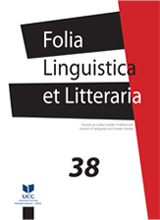Zločin i kazna u poglavlju „Bunt”, u romanu Braća Karamazovi F. M. Dostojevskog
CRIME AND PUNISHMENT IN THE CHAPTER “REBELLION”, IN THE NOVEL “THE BROTHERS KARAMAZOV” OF F. M. DOSTOEVSKY (Problems of the suffering of the innocent)
Author(s): Marina KoprivicaSubject(s): Christian Theology and Religion, Russian Literature, Eastern Orthodoxy, Philosophy of Law
Published by: Filološki fakultet, Nikšić
Keywords: Crime; punishment; rebellion; “The brothers Karamazov”; Dostoevsky; sufferings of innocents; children; faith; freedom; Christ
Summary/Abstract: F. M. Dostoevsky is one of the world's great writers who, while preserving the autonomy of a literary work, incorporated into his works issues of an ethical-philosophical and religious character. He permeated his works with echoes of these topics, but, in addition to the literary stamp, in some chapters he concretized ethical-philosophical and religious issues, for example, in the novel "The Brothers Karamazov", in the chapters "Rebellion" and "The Grand Inquisitor”. Concerning his spirituality and his perspective on life and society, Dostoevsky belongs to writers whose moral norms are the foundation and imperative of their poetics. He paid special attention to those who were "insulted and humiliated, ", the so-called "little people", especially children who suffer in the world of adults. In this light, we can also say that the title of the chapter "Rebellion" is a seal of Dostoevsky's work, and our work focuses on the central theme of "Rebellion" - the relationship of adult characters to the suffering of children in the world, and the very purpose of punishment for crimes which cannot adequately be redeemed. By analyzing this key chapter of the novel, through concrete images of the suffering of children and the attitudes of Ivan Karamazov, we emphasize the motif of crime and punishment in "The Brothers Karamazov": the question of freedom, that is, free will, but also love towards people who are close, which Dostoevsky problematizes, especially in the parent-child relationship. We also point out the creative task of this Russian writer; his effort to solve the eternal enigma of man as a being, through which the writer wants to solve the riddle of God. Ivan's rebellion against such an arrangement of God is also shown, in which the suffering of the innocent is allowed, with the hero's rejections of future harmony at the expense of the suffering of the innocent and powerless. In this chapter, which has so far received little attention in literary criticism, Dostoevsky also questioned the eternal questions of man through the experience of lived truth, with the view that there is no goal worthy of a single human life or a child's tears. In his complex task, synthesizing in the sphere of literature, ethical-philosophical and religious attitudes, Dostoevsky determines the essence of man and his moral values, opposing the postulates of the notion of unconditional love to rational will, determined by social, generally accepted factors. Based on a wider range of contrasts and contradictory attitudes of Dostoevsky's heroes, especially Ivan Karamazov in "Rebellion", from atheism, faith and agnosticism, to rebellion and preaching, we conclude that these categories are strongly intertwined in the rich literary amplitude of Dostoevsky - writer and ethicist, philosopher, and preacher in literature - and not only permeate, but always end with the apotheosis of a love for man, especially for the so-called "little man", and for unprotected children, indicating the author’s strong compassion for the suffering of the innocent.
Journal: Folia Linguistica et Litteraria
- Issue Year: 2021
- Issue No: 38
- Page Range: 147-161
- Page Count: 15
- Language: Serbian

